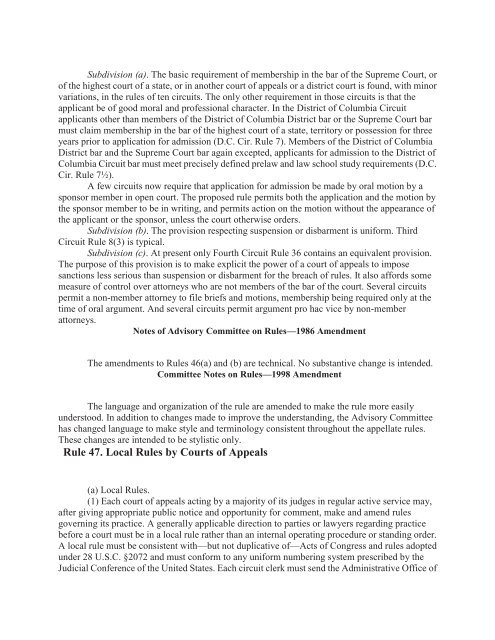Federal Rules of Appellate Procedure 2014-2015, 2014a
Federal Rules of Appellate Procedure 2014-2015, 2014a
Federal Rules of Appellate Procedure 2014-2015, 2014a
You also want an ePaper? Increase the reach of your titles
YUMPU automatically turns print PDFs into web optimized ePapers that Google loves.
Subdivision (a). The basic requirement <strong>of</strong> membership in the bar <strong>of</strong> the Supreme Court, or<br />
<strong>of</strong> the highest court <strong>of</strong> a state, or in another court <strong>of</strong> appeals or a district court is found, with minor<br />
variations, in the rules <strong>of</strong> ten circuits. The only other requirement in those circuits is that the<br />
applicant be <strong>of</strong> good moral and pr<strong>of</strong>essional character. In the District <strong>of</strong> Columbia Circuit<br />
applicants other than members <strong>of</strong> the District <strong>of</strong> Columbia District bar or the Supreme Court bar<br />
must claim membership in the bar <strong>of</strong> the highest court <strong>of</strong> a state, territory or possession for three<br />
years prior to application for admission (D.C. Cir. Rule 7). Members <strong>of</strong> the District <strong>of</strong> Columbia<br />
District bar and the Supreme Court bar again excepted, applicants for admission to the District <strong>of</strong><br />
Columbia Circuit bar must meet precisely defined prelaw and law school study requirements (D.C.<br />
Cir. Rule 7½).<br />
A few circuits now require that application for admission be made by oral motion by a<br />
sponsor member in open court. The proposed rule permits both the application and the motion by<br />
the sponsor member to be in writing, and permits action on the motion without the appearance <strong>of</strong><br />
the applicant or the sponsor, unless the court otherwise orders.<br />
Subdivision (b). The provision respecting suspension or disbarment is uniform. Third<br />
Circuit Rule 8(3) is typical.<br />
Subdivision (c). At present only Fourth Circuit Rule 36 contains an equivalent provision.<br />
The purpose <strong>of</strong> this provision is to make explicit the power <strong>of</strong> a court <strong>of</strong> appeals to impose<br />
sanctions less serious than suspension or disbarment for the breach <strong>of</strong> rules. It also affords some<br />
measure <strong>of</strong> control over attorneys who are not members <strong>of</strong> the bar <strong>of</strong> the court. Several circuits<br />
permit a non-member attorney to file briefs and motions, membership being required only at the<br />
time <strong>of</strong> oral argument. And several circuits permit argument pro hac vice by non-member<br />
attorneys.<br />
Notes <strong>of</strong> Advisory Committee on <strong>Rules</strong>—1986 Amendment<br />
The amendments to <strong>Rules</strong> 46(a) and (b) are technical. No substantive change is intended.<br />
Committee Notes on <strong>Rules</strong>—1998 Amendment<br />
The language and organization <strong>of</strong> the rule are amended to make the rule more easily<br />
understood. In addition to changes made to improve the understanding, the Advisory Committee<br />
has changed language to make style and terminology consistent throughout the appellate rules.<br />
These changes are intended to be stylistic only.<br />
Rule 47. Local <strong>Rules</strong> by Courts <strong>of</strong> Appeals<br />
(a) Local <strong>Rules</strong>.<br />
(1) Each court <strong>of</strong> appeals acting by a majority <strong>of</strong> its judges in regular active service may,<br />
after giving appropriate public notice and opportunity for comment, make and amend rules<br />
governing its practice. A generally applicable direction to parties or lawyers regarding practice<br />
before a court must be in a local rule rather than an internal operating procedure or standing order.<br />
A local rule must be consistent with—but not duplicative <strong>of</strong>—Acts <strong>of</strong> Congress and rules adopted<br />
under 28 U.S.C. §2072 and must conform to any uniform numbering system prescribed by the<br />
Judicial Conference <strong>of</strong> the United States. Each circuit clerk must send the Administrative Office <strong>of</strong>


















